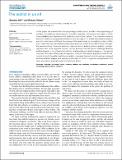The Addict in Us all
Author(s)
Holton, Richard; Dill, Brendan Eddings
DownloadDill-2014-The Addict in Us all.pdf (456.5Kb)
PUBLISHER_CC
Publisher with Creative Commons License
Creative Commons Attribution
Terms of use
Metadata
Show full item recordAbstract
In this paper, we contend that the psychology of addiction is similar to the psychology of ordinary, non-addictive temptation in important respects, and explore the ways in which these parallels can illuminate both addiction and ordinary action. The incentive salience account of addiction proposed by Robinson and Berridge (1–3) entails that addictive desires are not in their nature different from many of the desires had by non-addicts; what is different is rather the way that addictive desires are acquired, which in turn affects their strength. We examine these “incentive salience” desires, both in addicts and non-addicts, contrasting them with more cognitive desires. On this account, the self-control challenge faced by addicted agents is not different in kind from that faced by non-addicted agents – though the two may, of course, differ greatly in degree of difficulty. We explore a general model of self-control for both the addict and the non-addict, stressing that self-control may be employed at three different stages, and examining the ways in which it might be strengthened. This helps elucidate a general model of intentional action.
Date issued
2014-10Department
Massachusetts Institute of Technology. Department of Linguistics and PhilosophyJournal
Frontiers in Psychiatry
Publisher
Frontiers Research Foundation
Citation
Dill, Brendan, and Richard Holton. “The Addict in Us All.” Frontiers in Psychiatry 5 (October 9, 2014).
Version: Final published version
ISSN
1664-0640